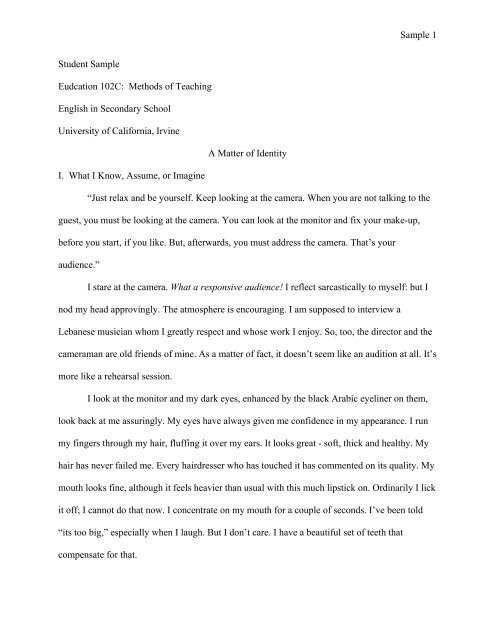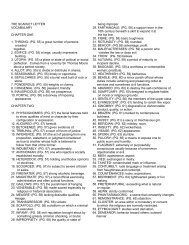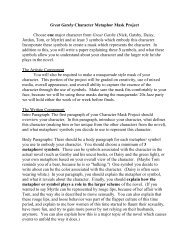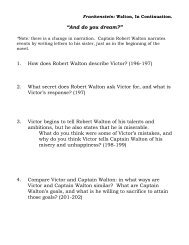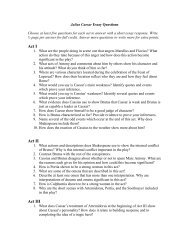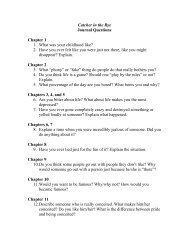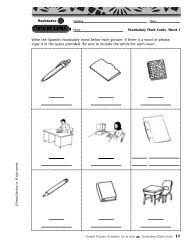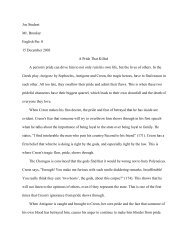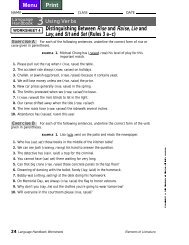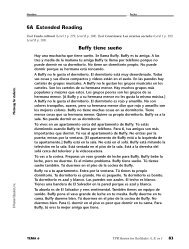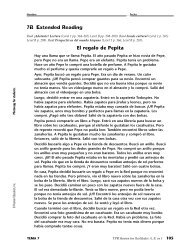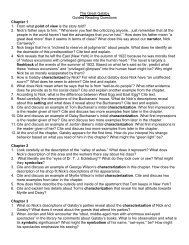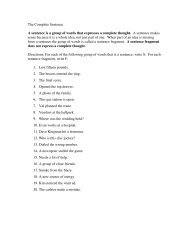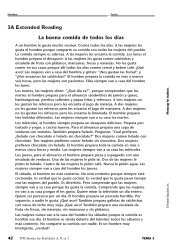Create successful ePaper yourself
Turn your PDF publications into a flip-book with our unique Google optimized e-Paper software.
<strong>Sample</strong> 1<br />
<strong>Student</strong> <strong>Sample</strong><br />
Eudcation 102C: Methods of Teaching<br />
English in Secondary School<br />
University of California, Irvine<br />
A Matter of Identity<br />
I. What I Know, Assume, or Imagine<br />
“Just relax and be yourself. Keep looking at the camera. When you are not talking to the<br />
guest, you must be looking at the camera. You can look at the monitor and fix your make-up,<br />
before you start, if you like. But, afterwards, you must address the camera. That’s your<br />
audience.”<br />
I stare at the camera. What a responsive audience! I reflect sarcastically to myself: but I<br />
nod my head approvingly. The atmosphere is encouraging. I am supposed to interview a<br />
Lebanese musician whom I greatly respect and whose work I enjoy. So, too, the director and the<br />
cameraman are old friends of mine. As a matter of fact, it doesn’t seem like an audition at all. It’s<br />
more like a rehearsal session.<br />
I look at the monitor and my dark eyes, enhanced by the black Arabic eyeliner on them,<br />
look back at me assuringly. My eyes have always given me confidence in my appearance. I run<br />
my fingers through my hair, fluffing it over my ears. It looks great - soft, thick and healthy. My<br />
hair has never failed me. Every hairdresser who has touched it has commented on its quality. My<br />
mouth looks fine, although it feels heavier than usual with this much lipstick on. Ordinarily I lick<br />
it off; I cannot do that now. I concentrate on my mouth for a couple of seconds. I’ve been told<br />
“its too big,” especially when I laugh. But I don’t care. I have a beautiful set of teeth that<br />
compensate for that.
<strong>Sample</strong> 2<br />
Having given myself the “once-over,” I practice one of my best camera-ready smiles. As<br />
my lips curve, the tip of Arabic nose dips down right into the middle of my smile. I knew it, I<br />
mused to myself, constricting my smile. I knew my nose would get into it! I study my nose; it sits<br />
there otherwise unobtrusively. But when I smile again, I can only watch as it dominates my face.<br />
Feeling uneasy, I take the tip of my nose between my fingers and press it back and then up. I<br />
peer askance at myself in the mirror, considering the adjustment, and reevaluate my smile, then<br />
my head to check my profile. Of course it looks better . . . or maybe it doesn’t, I think<br />
ambivalently. It’s as thought I’ve seen my nose for the very first time. Yet I cannot remember<br />
ever not seeing it. I feel ridiculous because here I am manipulating it as if it were some newly<br />
discovered piece of my anatomy- and a not very attractive one at that. Don’t make too much of it,<br />
I tell myself.<br />
Momentarily, I try to think of some of the positive remarks that people have made about<br />
this nose of mine: “It is distinctive”; (so is a rhino’s horn), “It’s got character”; (maybe it is a<br />
character); “It suits your face”; (perhaps it should be wearing a suit);”It’s….er… typically<br />
Arabic”; (sure, just like a camel’s hump); “At least it’s not bigger than a breadbox!” (but it<br />
couldn’t fit inside a breadbox either). Nothing seems reassuring, as I force it closer to my face.<br />
“ You surely would look gorgeous that way,” says the director who has been watching<br />
me all this time. I burst into laughter.<br />
“You really think so? I‘m not so sure. I think I like my nose the way it is,” I respond,<br />
trying to conceal my ambivalence.<br />
“C’mon, Intisar, I don’t think you like it that much. Look at your profile. It would make<br />
a lotta difference if your nose were a little shorter and lacked that Arabic bump. You know, TV<br />
is a helluva sensitive medium. People out there focus on your face continuously. And the nose
<strong>Sample</strong> 3<br />
seems to be a focal point. You know what I mean? You could have them focus on your eyes<br />
instead by getting an ordinary nose. I got an idea: why don’t you consider having a nose job for<br />
this opportunity?”<br />
“I really don’t know. I am not sure,” I reply candidly as I turn to start the interview.<br />
Two days later, the director called concerning the test.<br />
“…You did wonderfully, Intisar. Presences, personality, voice, and diction - all in all just<br />
fine. But like I said last time, your nose at some points, gets all the attention. You been thinking<br />
about my suggestion? I’m telling you, it would be a guaranteed opportunity.” I manage to give a<br />
diplomatic but noncommittal response to his query; and we end up discussing everything but my<br />
nose.<br />
I have to admit to myself that I have been thinking about what the director said, but not<br />
without lots of ambivalence. My nose has been functioning well for the thirty-three years, except<br />
for the usual colds and sinuses. It has never affected my confidence, nor has it interfered with my<br />
activities. The truth is, however, that I do not like it. I have been always sarcastic about it,<br />
wishing I could change it. Yet the idea of nose surgery - cutting bones and removing cartilage,<br />
and I don’t know what else, frightens me. I wish there were some kind of physical exercise that<br />
could fix it up pressing, pushing, rubbing, molding, anything but surgery.<br />
The job as a hostess on a cultural program for Arab-American TV is still available to me<br />
in January, just six months from now. I must make a decision; cosmetic surgery, a new<br />
opportunity, perhaps a new career or my life (including my nose) as it is.<br />
A week passed after the telephone call, and I was still reflecting on the psychological<br />
aspect of cosmetic surgery and consulting with my closest friends. Although I have not been<br />
completely satisfied with the look of my nose, I have accepted it as part of my personal as well
<strong>Sample</strong> 4<br />
as my ethnic identity. Would my decision now, in favor of cosmetic surgery, offend my sense of<br />
identity and stigmatize me as an inferior person who’s complying with other people’s aesthetic<br />
criteria! One friend, who thinks my nose is “distinct,” does not favor unnecessary cosmetic<br />
surgery. He argues Asian girls who have operations on their eyes to make them look bigger and<br />
“rounder” are only deceiving themselves. And black women who straighten their air are<br />
admitting a sense of inferiority.<br />
I think, if that is the case, then we should question the validity of our use of makeup, our<br />
interest in fashions or hairstyles, and anything we do that may change our very natural<br />
appearance. But in so doing, would we be denying every culture part of its aesthetic aspect, its<br />
standards of beauty? And would we also be denying human beings the right to share their<br />
aesthetic standards? Certainly, undergoing cosmetic surgery shouldn’t require or be accompanied<br />
by any special apologies; it should be accepted as a means to improve and individual’s<br />
appearance when she/he has the choice. Nevertheless, when it comes to cosmetic surgery, there<br />
is a great deal of risk, and one should take into consideration the possibilities of an unsuccessful<br />
surgery, the potential hazards associated with the surgical procedure. Accordingly, I started my<br />
search for reliable and factual information, even though I was still ambivalent about surgery.<br />
II. The <strong>Search</strong><br />
Dr. Michael J. Watanabe, a plastic surgeon at Saddleback Medical Center, recommended<br />
that I start my inquiry by reading his group’s medical publications, which answer the most<br />
frequently asked questions about nasal surgery. He also recommended that I plan on a<br />
consolation visit whereby an appraisal for my case would be specific and personal.
<strong>Sample</strong> 5<br />
According to Cosmetic Surgery, one of the medical booklets, aesthetic rhinoplasty is<br />
performed to reduce the overall size of the nose: to reshape a tip, or remove a nasal hump or to<br />
improve a poor angle between the nose and the upper lip. One or all of these changes can be<br />
made during a single operation. This booklet had an encouraging and realistic tone. While not<br />
denying the overall risk of undergoing any surgery, it assures the reader that the surgical<br />
procedures have been repeated successfully thousands of times and are dependable when<br />
executed by experienced, competent cosmetic surgeons. It attributes the yearly increase in the<br />
number of individuals who undergo cosmetic surgery to the social and economic influences,<br />
which place emphasis upon appearance. This includes “younger people seeking peer acceptance<br />
and older people facing their own challenge maintaining positive attitudes for an extended time”<br />
(Cosmetic, 8). In my case, I am thirty-three years old and would be risking a perfectly wellfunctioning<br />
nose for the sake of a new career opportunity! Would it be worth it? Well, I didn’t<br />
know. I hadn’t learned enough about the surgical procedures yet. I might be more decisive if I<br />
did.<br />
Surgery of the Nose, another medical booklet, exemplifies and illustrates the procedures<br />
of the different kinds of rhinoplasty. I examined the illustrations casually, with a mirror in my<br />
hand, comparing them to my nose, trying to appraise my own case. But as I started reading, I<br />
became more apprehensive:<br />
On the surgeon’s recommendation, the patient may be operated on in the<br />
surgeon’s office, in an outpatient facility, or may be admitted to a hospital. The<br />
surgery may be performed under a local or general anesthetic… In most nasal<br />
surgery an incision is made inside the nostrils, through which the surgeon can cut,<br />
trim, and manipulate the cartilage and bone to reshape the nose and alter its
<strong>Sample</strong> 6<br />
external appearance. A hump is removed by using a sawing instrument or a chisel<br />
and then bringing the nasal bones together to form a narrower bridge. (Surgery, 6)<br />
This is frightening! I tell myself, staring down at the words - cut… trim . . . sawing . . .<br />
instrument . . .chisel . . . bridge. . . .This sounds more like carpentry, with my nose being the<br />
project. I touch my entire nose- protectively. The “hump” that I found so offensive in the monitor<br />
three weeks ago is hardly there now. It’s not big at all. I grab the mirror and peer into its<br />
magnifying side. Even that side agrees with me. Well, I ponder myself, why a hump removal? I<br />
don’t need that. Maybe what I need is just reducing the size of the nasal tip and improving the<br />
angle between the nose and my upper lip! I continue reading.<br />
Removing cartilage reduces the size of the nasal tip and provides better contour. .<br />
. .To improve the angle between the nose and the upper lip, trimming the septum<br />
through the incisions in the nostrils elevates the nasal tip . . . . Following surgery,<br />
a splint composed of tape and a plastic or plaster overlay is applied to the nose to<br />
maintain bone and cartilage in the new shape. Nasal packs are inserted to protect<br />
the septum. (Surgery, 6)<br />
This sounded less frightening to me. But I became anxious to find out about the<br />
postoperative recovery. The medical publications were too general. I felt I needed a firsthand<br />
narrative from someone who had actual experience. So I called Marcia Smith, one of Dr.<br />
Watanabe’s patients, who agreed to share her experience.<br />
Although she is not completely recovered yet, Marcia believes she has had a satisfactory<br />
result. Her surgery consisted of correction of a deviated septum, hump removal, reduction of tip,<br />
and angle improvement. All this was done in the surgeon’s office, and under a local anesthetic.
<strong>Sample</strong> 7<br />
Marcia, thirty-eight years old now, regrets the fact she did not benefit from cosmetic surgery<br />
fifteen years ago.<br />
“ I always thought about it,” she told me, “ but never knew it was so easy. I went into the<br />
office at 7:00 AM and at 12:30 PM I was home. I had the packing on my nose for one day. I<br />
stayed at home one week. The second week I went back to work.”<br />
“ You sound like you just had fun. Marcia! What about the cast and the pain?” I inquired<br />
with astonishment.<br />
“Oh, the cast was on for two weeks. But it is not as uncomfortable as you might think,<br />
and the medication takes care of all the pain. However, it is very important to adhere to the<br />
postoperative instructions. I was restricted from activities that raise the blood pressure like<br />
jogging, swimming, or ever bending, for about four weeks.”<br />
“Didn’t the swelling bother you? They say it persists for months?” I asked.<br />
“ Yes, this is the hard part of it. As a matter of fact, it has been three months now and my<br />
nose still feels numb and is a little swollen, but it is not noticeable after the first two weeks;<br />
besides, I had no bruising around the eyes,” she answered me assuringly (Smith).<br />
III. What I Discovered<br />
Despite the fact that Marcia’s story was - and still is - heartening, the particulars of her<br />
case are different from mine. She apparently never accepted her nose and was, in that sense,<br />
convinced that she should undergo surgery. As for me, even as ambivalent as I am, I don’t think<br />
I rejected my nose. Whether it is viewed as socially acceptable or not, it remains my nose. It does<br />
what it’s supposed to do. And the more I’ve thought about cosmetic surgery, the more I equate it<br />
with a violation of the unique characteristics of my nose. Noses such as mine may someday
<strong>Sample</strong> 8<br />
become fashionable - even ideal. I think I’ll just accept my own standards, which means<br />
accepting all of me.<br />
That week, the director called to know what my final decision was. With a new found<br />
confidence resulting from my search, I said, “ No nose job- opportunity or not.” He groaned but<br />
was unsurprised: “ I knew you wouldn’t go for that. But I thought I’d give it a shot. Anyway,<br />
come over next week and bring your nose with you for rehearsal.”
<strong>Sample</strong> 9<br />
Works Cited<br />
Cosmetic Surgery. New Jersey: Plastic Surgery Publications, Inc., 1977.<br />
Smith, Marcia. Telephone Interview. 12 June 1985.<br />
Surgery of the Nose. Chicago: American Society of Plastic and Reconstructive Surgeons, Inc.,<br />
1984


